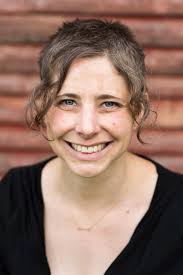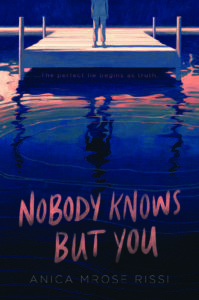Sponsored by Skyhunter by Marie Lu, with Fierce Reads
From #1 New York Times-bestselling author Marie Lu comes an immersive world where the only hope against overwhelming evil is a team of warriors willing to sacrifice everything to save what they love.
The Karensa Federation has conquered a dozen countries, leaving Mara as one of the last free nations in the world. Refugees flee to its borders to escape a fate worse than death—transformation into mutant war beasts known as Ghosts. The Strikers, Mara’s elite fighting force, are trained to stop these monsters. But as the number of Ghosts grows, defeat seems inevitable. Still, one Striker refuses to give up hope.
Hey YA Readers!
I’m really excited to share today’s guest newsletter with you.
 A few years back, I met Anica Mrose Rissi at a YA book conference, and I quickly fell in love with her first YA book, Always Forever Maybe. I’d known Anica’s work before, but through a different avenue: she’s been the editor of a number of YA books I’ve also loved. After leaving her role as an editor, she took on writing full time and has released several books for young readers.
A few years back, I met Anica Mrose Rissi at a YA book conference, and I quickly fell in love with her first YA book, Always Forever Maybe. I’d known Anica’s work before, but through a different avenue: she’s been the editor of a number of YA books I’ve also loved. After leaving her role as an editor, she took on writing full time and has released several books for young readers.
Her second YA book hit shelves last week, and I was eager to find out how it feels to transition from editing books to writing them. How different is the mindset?
Readers, this is a fun peek behind the curtains of learning to let go of control in storytelling, and I hope you enjoy it as much as I do.
(Confession: Nobody Knows But You, Anica’s new book, is sitting right here for me to read next, but I know because it focuses on friendship, like her first YA, I’m going to love it. It’s a slender read and has had so many rave reviews — I bet by the time this newsletter hits your inbox, I’ll be screaming about how everyone needs to pick this up ASAP).
Without further ado, though, Anica!
**
 Confession: I am a control freak.
Confession: I am a control freak.
I hate doing things I’m not good at. I’m most comfortable when I am in charge. I am obsessive about, well, everything. I often go to great lengths to avoid being vulnerable. I dislike messes and problems I can’t fix.
In short, I am a terrible first drafter.
Yet time and again, I return to the messiest, most vulnerable task that I know. I keep writing books, despite that they never go as planned. Despite feeling like I’m awful at it every time I start one. Maybe even, I’m realizing, because of it.
It didn’t always used to be this way. Before I was a writer, I worked for more than thirteen years as book editor, and editing suited me well. If being an author is one continuous lesson in letting go, being an editor is the opposite. It is an editor’s job to have a clear vision for, and unwavering confidence in, her projects. To believe in each book and its author, even—or perhaps, especially—when the author doesn’t fully believe in it herself.
When I read manuscripts on submission, deciding what books to acquire—projects such as Brittany Cavallaro’s A Study in Charlotte, Tiffany D. Jackson’s Allegedly, and Maureen Johnson’s Truly Devious—I looked not only for a feeling of, “Yes! I love this so much I want to read it multiple times and spend my nights and weekends with it” (an editor’s reality) but also, “and I know exactly how to pitch this book to the world and help make it the best it can be.”
As a writer, I chase the opposite feeling—a sense of, “I don’t know what this is yet, but there’s something in it I need to explore.” The magic of writing comes from not knowing, and not yet understanding. A draft is an exploration—a treasure hunt with no map. If I could already see how things would look when I got there, it wouldn’t be worth the long journey.
But gosh is it uncomfortable along the way. Uncomfortable, yet once you give in to it, exhilarating.
When I started the draft of my new YA thriller, Nobody Knows But You, I knew only a few things about it. I knew the book would involve a brief but life-changing friendship—a deep, essential bond formed across a single summer. I knew the story of that friendship, and the secrets held within it, would be told in the form of letters typed from one friend to the other after their summer was over. I knew the other friend would not write back. I knew the letters would be interspersed with news clips, text messages, a court transcript, and social media posts to reveal other secrets and perspectives.
Other than that, I knew nothing—not what the secrets would be, or why the letters would go unanswered. Not who these friends were, or what had come between them. Those things I had to learn as I wrote, letting the characters—and my questions—lead the way. Questions of how our friendships shape who we are. Of how well you can really know someone else, or even know yourself. Of how the lies a person tells might reveal their deepest truths.
I dove in without know what I would find beneath the surface, and let the current of the story take control.
Once the draft was out, my control-freak side got to come back in and obsess over every beat. I got to use the revision skills I’d honed as an editor, and let my editor’s vision and confidence buoy me through moments of doubt. We shaped it into something I’m proud of, and now, I’m letting go again.
My book is going out into the world to seek its fortune, and there’s nothing I can do besides wish it well and hope for the best. I hope it finds readers, and that some of them will love it. But I can’t control that.
All I can do is open a new draft, lean into the uncertainty, and learn how the story will go.
Whether you’re a writer or not, I suspect that something here will resonate, especially as we live through times where certainty is anything but certain.
Thanks for hanging out, y’all, and thanks, Anica, for sharing.
We’ll see you again later this week!
— Kelly Jensen, @heykellyjensen on Instagram and editor of Body Talk, (Don’t) Call Me Crazy, and Here We Are.
